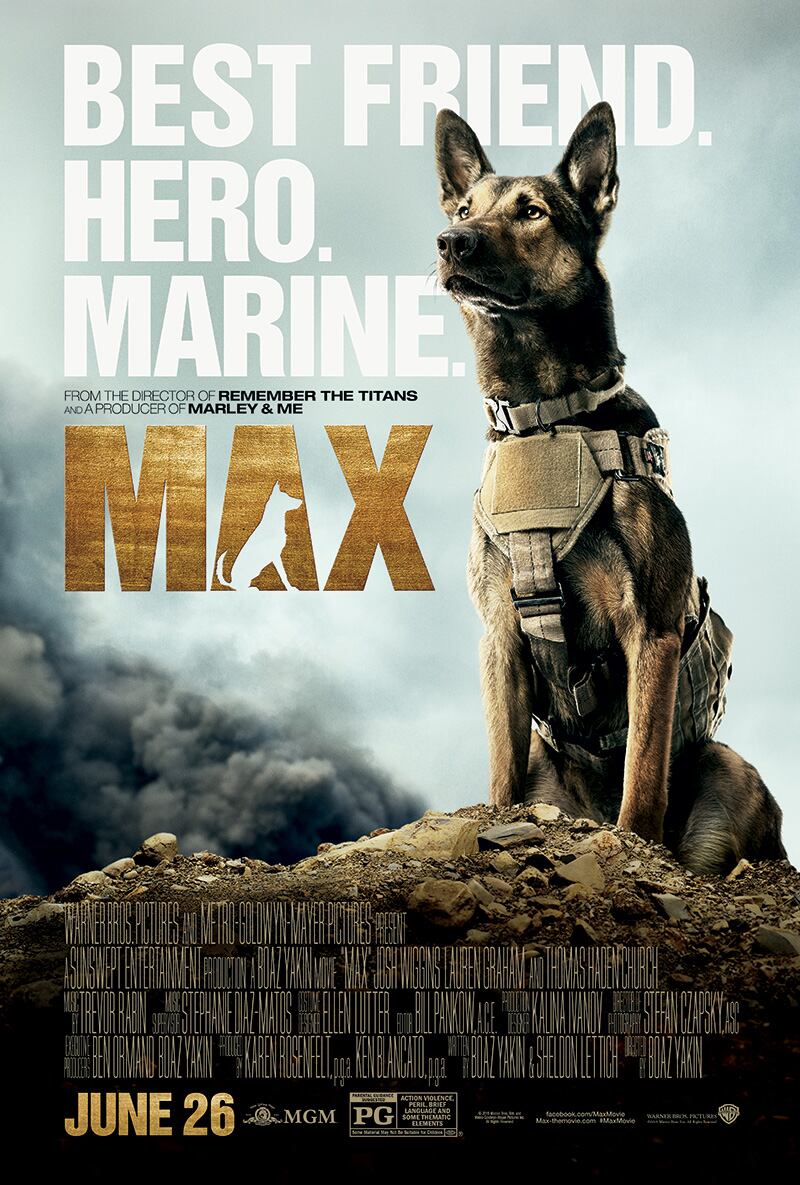
Movie poster for "Max."
Photo Credit: Warner Bros.
But when a national newspaper magazine published a story on his parents, it wasn't about his heroics on a dusty road in Iraq or the unbearable anguish they felt after losing him. This piece was different — yet cut from the same gallant cloth.
Several years after their son's death, Deb and Dan Dunham adopted Gunner, an improvised explosive device-sniffing dog diagnosed with post-traumatic stress after a deployment to Afghanistan.
According to the article in The Wall Street Journal, Gunner was plagued with haunting memories — suffering and seeking cover when lightning cracked during a thunderstorm or when a neighbor set off a firework.
Now a new movie from Warner Bros. spotlights the military's more than 3,000 working dogs in Iraq and Afghanistan since 9/11.
Military Times attended an advance screening of the movie "Max" that comes out in theaters nationwide this Friday, June 26, and talked to actress Lauren Graham (TV's "Parenthood," "Gilmore Girls") about the film's importance.
"Max" tells the story of a military working dog paired with U.S. Marine Kyle Wincott (Robbie AmellArnell, "The Flash") who is killed during a deployment to Afghanistan. Suffering from PTS, Max connects emotionally with Kyle's younger brother, Justin (Josh Wiggins, "Hellion") and is adopted by the Wincott family (Graham and Thomas Haden Church, "Sideways").
As speculation circulates around the death of Justin's brother, Max might be the only one who can reveal the truth about what happened in Afghanistan, which leads Max and Justin on a dangerous path to discovery involving gun play, unsavory criminals and a scene vaguely reminiscent of the showdown between Harrison Ford and Tommy Lee Jones in "The Fugitive."
But strip away the plotline of the hero dog versus the stereotypical bad guys — and the highly unlikely, picture-perfect, high-definition Skype connection between Texas and a remote forward operating base in Afghanistan — and you will find a movie that truly honors the four-legged veterans and their handlers.
Since 2003, 26 military working dogs and 25 handlers have been killed in the wars in Iraq and Afghanistan, a statistic shown at the end of the movie. Oscar-nominated documentarian, Sebastian Junger once wrote, "War is life multiplied by some number no one has ever heard before." And while poetically true, this sediment leaves us with the burdening question of what is life multiplied by after war?
Graham says she felt a personal responsibility to get her character, Pamela Wincott, right, especially during the scene shown in the trailer, depicting the devastating change that is all too familiar to military families. The hanging blue star, which signifies to onlookers that a loved one is serving — suddenly and unexpectedly — changes to gold with a knock on the door.
"The whole movie is about this family recovering and really asking themselves, 'Can we ever recover from this?' " Graham said. "The [movie's] framework is at times a very happy story, but it's really a war story, a family story and a dog story that hopefully all leads to a family rebuilding and coming to a place where they can begin to imagine what life is like [without their son], which is hard."
In one scene, Max's PTS is triggered when fireworks erupt in the night sky. For veterans suffering from similar symptoms, this scenario is all too real, but Graham says the scene drives home the war's effect on the human condition.
"To me, it's like, wow, look at what this dog experienced. ... I mean, if this happens to an animal that doesn't have all the powers for grieving that we have, just imagine what the human experience might be," Graham said.
"Max" marks the first military movie of 2015 for Warner Bros. since the overwhelming success of last year's Oscar-winning blockbuster "American Sniper" starring Bradley Cooper as decorated Navy SEAL Chris Kyle. However, Graham notes that "Max" is better suited to younger audience members, with a PG rating.
" 'American Sniper' came up a lot … when we were talking about honoring service members, but the problem is you can't take your 12-year-old to that, so it's always a fine balance because you want the movie to be entertaining and meaningful and tell the story in the right way that doesn't skip over the difficult parts and that doesn't make war glamorous, but also shows respect," Graham said.
With the movie opening in theaters Friday, Graham is hopeful that audiences see "Max" for its deeper message — a message that honors the sacrifices of families and service members.
"I think the most inspirational thing for me as a performer is telling a story that someone can see themselves in … and hopefully, the service member can feel recognized or a little bit understood," she said.
"I really hope they feel respected, honored and seen. In this case, what I hope is that this small family film is a kind of a thank you … that we acknowledge their hardship and what their families go through."





